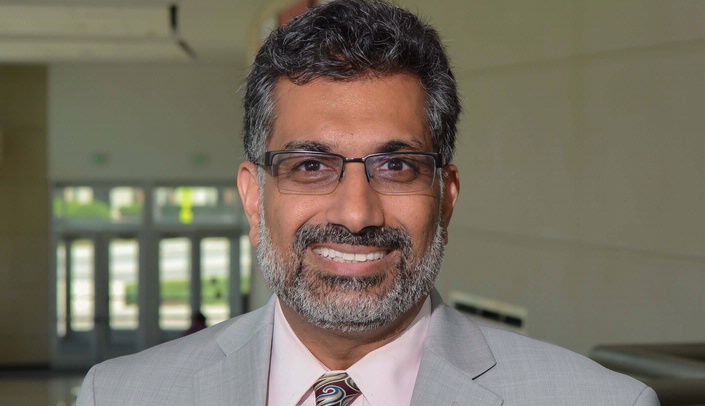The extraordinary lifetime adventures of Ali S. Khan, M.D., M.P.H., dean of the University of Nebraska Medical Center College of Public Health, as he worked to contain some of the world’s deadliest diseases, are described in his new book, “The Next Pandemic: On the Front Lines Against Humankind's Gravest Dangers.”
Dr. Khan spent 20 years at the Centers for Disease Control and Prevention (CDC), including five as the director of CDC’s Office of Public Health Preparedness and Response. Now, as dean, he has an important voice in the global conversation about how to survive the next pandemic.
“Tracking down disease outbreaks is an exciting and intimate mix of science and art,” Dr. Khan said. “I am thankful for the opportunity to share a behind-the-scenes look at the work of disease detectives to protect their communities and how to get ready for the next pandemic.”
“The Next Pandemic” is a vivid, humorous and unrestricted view of rampant and violent diseases, disasters narrowly averted and the tools we have to keep them at bay. It provides an inside account of the fight to contain the world’s deadliest diseases and the panic and corruption that make them worse.
In each of these stories, Dr. Khan reconstructs the chaos of those first moments on the ground, making life-and-death decisions based on limited and conflicting information, with local, federal and international authorities fighting to contain both the virus and the panic.
Dr. Khan fells the next pandemic will spawn from five sources — mutation; spillover from other species; lab accidents; bioterrorism; and natural disasters.
He shows that the danger of an outbreak is more real than ever in a world of climate change and global commerce, but that we need not live in fear. His career is a testament to the power of good information, habits and poise under pressure, as we work to fight whatever exotic contagion comes next.
“Infectious diseases are inevitable, but the next pandemic is not with better foresight, science and preparedness to protect the health in our communities,” Dr. Khan said.
The book, published by PublicAffairs, a member of the Perseus Books Group, was released May 24, but can be pre-ordered now on Amazon in hardcover or kindle editions.
“The Next Pandemic,” immerses readers into Dr. Khan's journey controlling potential pandemics during his long career at CDC. Here’s a glimpse at some of his activities:
- During the 1995 Ebola outbreak in Zaire, Dr. Khan worked among Red Cross workers digging mass graves, rescuing struggling patients from near-abandoned hospitals and ultimately finding Patient Zero.
- In 2001, he traveled to Washington, D.C., summoned by a midnight phone call, to track anthrax spores that had spread through the Senate Office building's ventilation system.
- In 2002, he was called to Singapore to revive quarantine strategies to limit SARS transmission, a contagious disease with no cure and no vaccine.
- In 2014, he was part of UNMC’s team to help treat patients from West Africa who were infected with the Ebola virus.
- The following year, Dr. Khan was twice called upon by the World Health Organization to provide epidemiologic assistance in Sierra Leone’s Ebola hot spots and assist in the country's national research agenda.
We are Nebraska Medicine and UNMC. Our mission is to lead the world in transforming lives to create a healthy future for all individuals and communities through premier educational programs, innovative research and extraordinary patient care.
